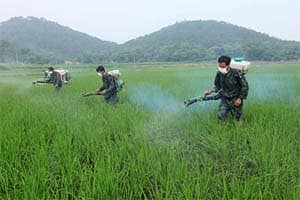 If you are waiting for the perfect time to subscribe to Monthly Review, wait no longer. The March issue of my favorite Marxist journal features two articles on capitalism and agriculture that every ecosocialist should read.
If you are waiting for the perfect time to subscribe to Monthly Review, wait no longer. The March issue of my favorite Marxist journal features two articles on capitalism and agriculture that every ecosocialist should read.
In A Rational Agriculture Is Incompatible With Capitalism, (the title is taken from by Karl Marx, in volume 3 of Capital), Fred Magdoff examines how decisions that are rational from the narrow perspective of making profits within capitalism have produced an agriculture that is environmentally and socially irrational.
“The pulls and pushes of the capitalist system, and the way it inherently develops as all sectors strive to maximize profits, produces an agriculture in which: (a) there are hungry people although there is an abundance of food; (b) there is little true cycling of nutrients, increasing the reliance on fertilizers at the same time that excess nutrients accumulate on factory animal farms and in the cities; (c) animals are raised inhumanely; (d) poor rotations are used; (e) farm labor and animal slaughterhouse labor is commonly treated unfairly (and/or cruelly); and (f) pollution with pesticides and fertilizers is widespread….
“A rational agriculture would be carried out by individual farmers or farmer associations (cooperatives) and have as its purpose to supply the entire population with a sufficient quantity, quality, and variety of food while managing farms and fields in ways that are humane to animals and work in harmony with the ecosystem.”
That would require radical social and economic change, to a system based on meeting human needs rather than accumulation of profits.
A companion article by Michael Friedman, GMOs: Capitalism’s Distortion of Biological Processes, shows how science that can produce beneficial results (most of the world’s insulin supply results from genetic engineering, for example) can be dangerous when it is used to maximize profit.
“In the two decades of growing worldwide GMO production, we have begun to see a body of evidence that GMOs fit the classical pattern: genetic modification has led to undesired and potentially disruptive consequences for biological and ecological processes. … Even if shown to be beneficial and risk-free, GMOs must not be employed as magic bullet solutions for broader health or agricultural problems, because each magic bullet engenders new problems.”
Under capitalism, as Richard Levins has written, “agriculture is not about producing food but about profit. Food is a side effect.” These articles are important contributions to building a movement that can reverse this system’s irrational priorities.
—–
Ian
More from my notebook ….


